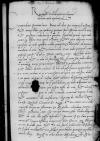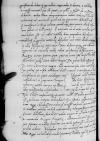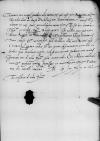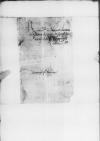Binas sub idem fere tempus Dominationis Vestrae Reverendissimae accepi ⌊⌋, ex quibus, quod gratum fore officium meum Dominationi Vestrae Reverendissimae perspexi, vehementer gaudeo. Summam enim exinde capio voluptatem, quod officia mea apud Dominationem Vestram Reverendissimam gratiam aliquam mereri agnoscam, ac inde equidem reddor promptior et alacrior ad omnia mandata Dominationis Vestrae Reverendissimae exhaurienda, cum video quicquid a me proficisci potest, id ab ea illustri gratia excipi.
Quod mihi dedit negotium Reverendissima Dominatio Vestra, ut simul atque litterae fuerint ex ⌊urbe⌋ allatae in manusque meas pervenerint, illas ad se perferendas curarem, ⌊reverendissimo etiam domino Culmensi⌋ de litteris ad possessionem accipiendam et civi cuidam in re ei necessaria, ut opera mea adessem, dabitur a me opera, ut huic Dominationis Vestrae Reverendissimae voluntati desiderioque satisfaciam. Scripsi ⌊Cracoviam⌋ [ad a]micos, ut si quid litterarum ex ⌊urbe⌋ afferatur, me certiorem de [his f]aciant, quo possem iussa Dominationis Vestrae Reverendissimae celerius perficere.
Si quae in urbe curanda venerint negotia Dominationi Vestrae Reverendissimae, committere illa confidenter dignetur domino ⌊Andreae Czarnkowski⌋, Gnesnensi canonico et ⌊regiae maiestatis⌋ secretario ac in ⌊urbe⌋ negotiorum regiorum sollicitatori et, nisi fallor, cubiculario summi pontificis. Neminem enim esse scio, qui maiore fide, studio, diligentia Reverendissimae Dominationi Vestrae illic possit inservire. ⌊Iuvenis⌋ est et claro genere natus et magna praeditus integritate, sollers praeterea atque industrius, ut eum studium suum Reverendissimae Dominationi Vestrae facile probaturum confidam et, si quid mandaverit, non fallet procul dubio spem et exspectationem illius.
⌊Boguss⌋, ut video, durior difficiliorque vult esse in persolvendo debito, quam ego vellem, nam multa se damna a nobilibus accepisse narrat, quae illi sarciri ex pacto a Reverendissima Dominatione Vestra deberent, video illum compensationem moliri inducere et velle calumniis id commodi, quod ad me pervenire deberet, ad se transferre. Ego tamen, quoad eius fieri poterit, illudi mihi non patiar in hac parte. ⌊Conventus⌋ noster, ut video, vacillat et verendum est, ne rebus infectis hinc propediem discedatur. Nobilitas a propositis articulis discedere non vult, domini nequaquam se illos suscepturos affirmant. Non desunt quoque, qui curant maxime, ut ⌊comitia⌋ nullis rebus constitutis dissolvantur. ⌊Rex senior⌋ partim aetate partim curis istis confectus lecto decumbit pedis etiam dolore magna ex parte lecto affixus.
In initio ⌊conventus⌋ magna erat controversia inter nuntios, ex quibus, qui a sola nobilitate electi erant, cum his, qui a dominis consiliariis et parte nobilitatis era[nt d]esignati, nihil volebant consultare, et propterea magna [eorum p]ars hinc discessit protestatione facta non per eos stare, q[uomi]nus de re publica impendentibus necessitatibus consuleretur.
De sigillo, in quo hic est dominus ⌊episcopus Cracoviensis⌋ confirmatus, fremunt multi et multae, quid inde est, futurum tempus indicabit.
Ex Italia affertur ⌊caesarem⌋ cum ⌊rege Christianissimo⌋ indutias inivisse eiusmodi, quemadmodum in tractatu praesentibus incluso continetur. ⌊Turcarum imperatorem⌋ ferunt delectum facere et moliri magna in perniciem Christianorum. De concordia ⌊regum Hungariae⌋ controvertentium, spes quae fuit suscitata in animis bonorum, non modo refrixisse, sed evanuisse penitus videtur. ⌊Valachus⌋ per nostros irritatus non mediocri strage maiestatis regiae aere militans contudit provincias ⌊Podoliae⌋ igne et ferro vastavit.
⌊Tartari⌋ seu Scytae finibus nostris imminent, qui nisi per ⌊regiam maiestatem⌋ stipendio dato in hostem ⌊Valachum⌋ convertantur, vires et saevitiam in nos sunt procul dubio conversuri. Est hic orator illustrissimi ⌊principis⌋ ⌊maiestatis regiae⌋ generi. Is audiri non poterit, donec ⌊regia maiestas⌋ revalescat. Exspectantur etiam oratores ⌊Turci⌋, ⌊Mosci⌋ et Venetorum, sed mallem illos non venire nisi ⌊Cracoviam⌋ propter urbis et loci huius obscuritatem. Alia non habeo quae scribam in praesens, sed si occurrent, scribam non invitus.
Interim me Dominationis Vestrae Reverendissimae gratiae commendo. Cui rectam valetudinem et prolixos quosque successus ex animo precor.



